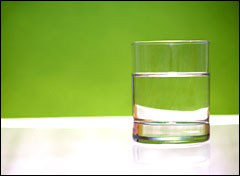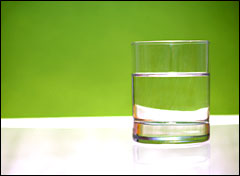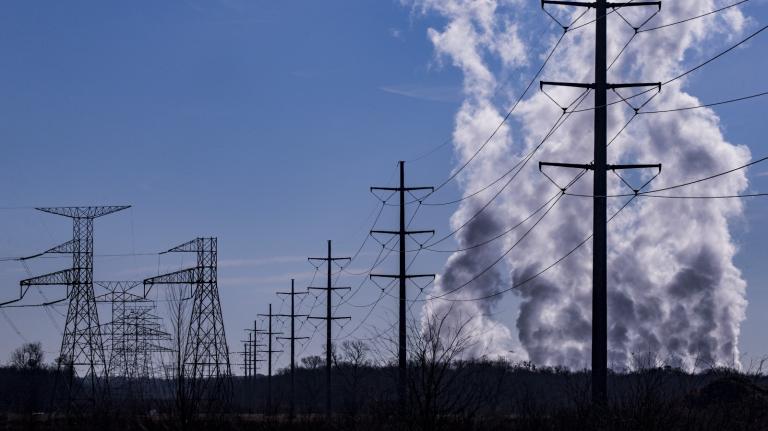Dear Umbra,
I live in an area that has fairly hard water. The calcium build-up on the sink faucets, shower enclosures, and even the dog water bowls is really bad, and hard to remove. So I have considered a full house water softener. However, I know nothing about them — but I do know you need to add salt to most (some eco-versions are ‘saltless’). Do you have any advice on this subject? I am off to crunch down a glass of water now.
Waiting for your reply,
Greg J.
Sugar Land, Texas
Dearest Greg,
Wait no longer. I wanted to learn about water softeners in any case, as I am living with hard water and it’s messing with my hair management techniques (as if the problems you mention above aren’t bad enough).

Soft drink?
Here’s what I learned. Water is considered ‘hard’ when it contains enough dissolved calcium, magnesium, and other minerals to leave annoying residues on pipes, water heaters, bodies, dog bowls, etc. The minerals jump aboard during the water’s passage through the Earth and are not from any evil pollution.
Soaps do not suds in hard water and may not wash away, leaving what one source poetically calls “soap curds.” The hardness of your water can be classified either according to your level of personal aggravation (mine went down when I considered that I wouldn’t call our residue “curdy”), or by testing the water for “grains per gallon” or parts per million. Those of you on a municipal water supply can ask your provider for the numbers. Water is considered very hard if it has over 10.5 grains per gallon.
Hard water causes household inefficiencies. In addition to the aforementioned soap issues, there are calcium deposits, which not only cloud glassware but also leave a coating of “scale” inside hot water heaters, rendering the heating mechanisms less effective, and can eventually clog pipes.
Water softeners remove the calcium and magnesium. From what I understand, the most common and accepted method of softening water is through a whole-house ion-exchange water softener. This is a sort of filter in which the water passes over sodium-soaked polystyrene beads on its way to your household appliances. The calcium and magnesium attach themselves to the beads, the sodium detaches and enters the water. After a while, the beads are themselves coated with minerals and must be “recharged,” that is, washed with a brine. Gallons and gallons of brine.
In all this saltiness lies our ecological problem. Though the sodium levels in treated water are not considered high for human ingestion, they do present difficulties in wastewater treatment. One of these difficulties is that treatment plants are not set up to remove the sodium, and hence are forced to discharge sodium-laden water into waterways, disturbing the natural balance of things. Water softeners are banned or strongly regulated in several places, including parts of Connecticut, California, and Texas, for this reason.
There are alternatives to ion exchange systems, but I can’t really divine how reputable they are. Of all of them, magnetic systems appear the most favored. Some people substitute potassium chloride for the sodium chloride, which really just creates a chloride problem, instead of a salt problem. If you look in to alternative systems and are persuaded that one is worth trying, be sure you are working with a reputable installer, get references, and do quite a bit of research before buying.
Should you choose a whole house system, here are ideas/recommendations I’ve gleaned from various cities and knowledgeable persons: Learn the mineral levels of your water in order to be sure you need a softener. Use less salt in your softener (this seems to be the same as “follow the directions”) and set the softener to recharge less frequently. Use a demand-initiated regeneration system, which will only recharge when the system needs it. And consider subscribing to a softener maintenance service, instead of adding the salt and flushing the system yourself, as these services can better conserve both water and salt than the average homeowner.
Best of luck with your crunchy water.
Residuely,
Umbra



